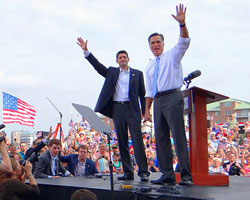The Missing Topic

The Candidates Are Talking, But Not About Climate Change
A voter perusing the Romney/Ryan campaign website would have a difficult time scrounging up any mention of climate change from among the laudatory praise of “carbon-based energy resources” and the startling dismissal of renewable energy as “politically favored” but a “failure.” The Obama/Biden campaign platform doesn’t fare much better under close scrutiny. While the president’s site champions the growth of the solar and wind industries under his tenure—and devotes a section to “Energy and the Environment” as opposed to Romney’s simple mention of “Energy”—none of the words “climate,” “carbon emissions” or “warming” are present. The Obama campaign directly appeals to readers on so-called energy independence, but these voters are left to draw the connection between renewables and climate science on their own.
For decades now, America’s neo-conservative movement has denied the existence of anthropogenic climate change as a matter of course. But this has proven to be a summer of record heat and drought, backed up by data from the National Oceanic and Atmospheric Administration. While it’s difficult for scientists to pinpoint any one weather event as a result of global trends, climate scientists like NOAA’s Tom Peterson remind us that the uncomfortable conditions Americans are experiencing this summer will occur far more often and with greater severity as global conditions change. So why, with so much recent anecdotal evidence in favor of climate change, are democratic political strategists avoiding it on the campaign trail?
The short answer is that the Obama campaign is reacting to supposed ambivalence on the part of supporters, who are worried first and foremost with the economy. Rather than stir up what is regarded as controversy over climate change, the president has supported a farm bill, not a reduction in carbon emissions, as the answer to nationwide drought while doubling down on his message of economic fairness. Democrats are wary of any issue that might distract from their focus on the economy, which they believe is the primary disaster voters want to hear about. The same can be said of Republicans, though sustainability advocates were never a constituency available for them to abandon.
The long answer involves a history of political missteps on the part of democrats trying to push climate legislation through Congress. As New York Times blogger John M. Broder explains, “Democrats, burned by the Senate’s rejection of legislation addressing climate change and wary of any policy that could be portrayed as raising energy costs, have fallen silent.” Furthermore, says Broder, “the public is divided [on climate change], with fervent minorities at either end of the debate and a broad crowd in the middle that believes that human activity is altering the climate but remains conflicted over what government, corporations and individuals should do about it.” This division has challenged the political will many Democrats had just a few years ago to tackle climate change through legislation, and has emboldened Republicans who once supported measures like cap-and-trade to stir up voter distrust with a renewed platform of climate skepticism.
What neither party seems to recognize, however, is the political fallout to come. One does not need to look towards some distant future of resource scarcity and rising sea levels in order to see climate change impacting Americans on a daily basis; in fact, the events of this summer illustrate just how relevant climate science is to the precise issues that the Romney and Obama campaigns are attempting to run on.
Record-shattering heat leads to the record-shattering droughts and wildfires that have swept the country this summer, with 63% of the U.S. experiencing a shortage of precipitation and 34 large fires burning tens of thousands of acres across the country. But the effects of these crises are not limited to the regions in which Americans are losing homes and crop yields; many economists now say that the 2012 drought will lead to higher food prices in the coming months and years, hitting an already shaky economy. Drought can also cause nationwide blackouts as power plants, lacking water to use as coolant, begin to shut down. At present, millions are already losing power due to extreme storm events that can also be tied to a global warming trend.
In addition to slashing the country’s bloated carbon footprint, many of the issues caused by warming can be addressed in the near-term by other policies. Reducing the amount of corn yield devoted to ethanol production, for instance, may help to combat rising food prices. Electrical infrastructure must also be updated for the 21st century, and state and federal governments must put forward a plan to create an American “smart grid” that can transmit electricity more efficiently and mitigate the effects of blackouts. Our water infrastructure is also outdated, and, as a Times op-ed points out, this year’s drought can be used as an opportunity to improve water conservation practices. Neither political party has put forward any such legislation, and neither presidential campaign wants to talk about these kinds of policies either.
It is difficult for either campaign to maintain its credibility on economic security and bolstering the American middle-class without acknowledging the devastating impact climate change is having, even today, on American prosperity. A decade or so in the future, Americans will look back on the Obama legacy on reducing carbon emissions as disappointing, while a Romney legacy, considering the lengths the GOP is going to discredit renewable energy and a so-called green economy, would be seen as downright pathetic.

